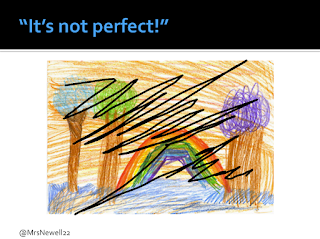Precision Over Perfection: My First Ignite Talk!
I had the amazing honor of being asked to do an Ignite Talk at the NCSM Annual Conference this year in San Antonio. If you're unfamiliar with the format of Ignite, here's a crash course: 10 speakers, each get 5 minutes and 20 auto-advancing slides. Terrifying? Yes. Exhilarating? That too.
Ignite speakers are asked to speak about something they're passionate about - something that "ignites" them. I chose to speak about privileging precision over perfection as we listen to and support students' mathematical ideas. Here's what I wanted to say (and here's the video link where you can watch what I actually said under pressure - ha!)
And, perfectionism is the worst! The pressure to be “perfect” inevitably sets us up for disappointment, and for me, the idea that there was a “perfect” rainbow had completely undermined any productivity at all.
This story reminds me of a quote from Voltaire – “The perfect” is the enemy of the good.And, how does this relate to math? In math, the “perfect answer” is often the enemy of the good try. We have students in our math classes who don’t say anything in math class because they’re afraid of not saying the “perfect” thing. How did this happen?
There are a few words in mathematics that are being misinterpreted as “perfection” – progress, proficiency, and precision. These are NOT the same thing. And, spoiler alert, perfection does not belong. Each of these, except perfection, implies a process.
"Mathematically proficient students” are not “mathematically perfect students” and, when we talk about “attending to precision”, it's not "attending to perfection" that we're after.
For so many teachers, “attend to precision” has been reduced to “the perfect word at the perfect moment”, yet precision is so much more than this.
We want precision in solutions, calculations, symbols and labels, but at the heart of precision is this idea of communication.
In the standards for mathematical practice, the very first sentence of the explanation for “attend to precision” is “mathematically proficient students try to communicate precisely to others.” Communication in math class involves the language we use, which includes precise vocabulary and specific language, but…
…but the reality is that “precise claims can be expressed in imperfect language.” In fact, attending to precision at the individual word meaning level can get in the way of students’ expressing their emerging mathematical ideas.
Kids use imperfect, but precise language to communicate from the time that they’re toddlers.When my son was 3, he wanted a grilled cheese sandwich, but didn’t have the name nailed down.So, he asked for “hot bread with the cheese of America on it.” Talk about precision!
This happens in mathematics too! I gave my daughter some lego towers and asked her to put them in order from shortest to tallest. When she was finished I of course asked “how did you know”. She said, “Mom, I hmmmed them.”
I said, “Tell me more about that…” And she said, “Well, I took this one and this one and I went, hmmmmm…. And I saw this one was taller. And then I took this one and this went and went hmmmm…..”
An amazingly precise claim! That if I hold these two towers next to each other, I can directly compare their heights. At that moment, she was ready for the precise words – measure, compare. But, if I had been listening for that, I might have missed the precision of her claim.
This idea of informal, intuitive language is something we need to leverage. If we as math educators believe that all students have good mathematical ideas, then we have to stop listening for the perfect word, and start working to “uncover the mathematics in what students say and do.”
We can move towards precision of language, but first we have to focus on the math.
So, when a 1st grader describes this line using the best word I've ever heard - "vertiwiggle" - you go with it! Because even though it's informal and imperfect, it's intuitive and so precise!
And someday, that 1st graders is going to have to graph vertiwiggle in Desmos, and at that point, sure, there’s a mathematical name for that… but let me tell you that in a totally unscientific survey of some of the amazing mathematicians here this week, we could not decide what the “perfect” name was… (90 degree rotation of a sin curve??? Maybe???)… and mostly everyone was happy with “vertiwiggle.”
So yes, we want students to precise so that they can be understood, but we have to let students lead with their ideas and claims. As they express these claims in imperfect language, we work to uncover the meaning and make a connection to the formal math language. The students then begin to use that language as those words become tools in their tool belt.
As we support students in honing their ideas, we get closer to the target. There may never be the “perfect” way to express an argument, but we can support students in building their precision. We want students to become precisionists not perfectionists, and they will work through some imperfect language to get there.
So when you head back to your school site or district, consider privileging precision over perfection. You'll hear things you didn't know you were listening for, and honor students in their perfectly imperfect language.

A huge shout-out to Suzanne Alejandre for the invitation to Ignite and to Zak Champagne for being my awesome Twitter buddy at the event!
























Comments
Post a Comment